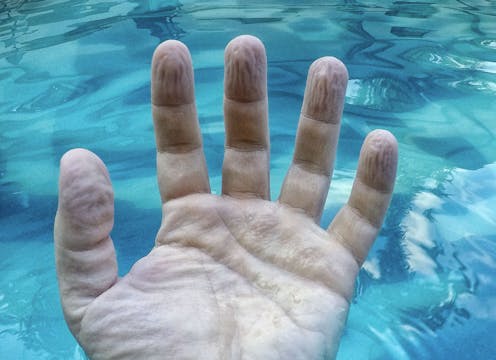Why do fingers get wrinkly after a long bath or swim? A biomedical engineer explains
- Written by Guy German, Associate Professor of Biomedical Engineering, Binghamton University, State University of New York

The narrowing of the blood vessels causes the overall volume of skin to reduce, puckering the skin into these distinct wrinkle patterns. It’s like how a dried-out grape becomes a wrinkled raisin – it’s lost more volume than surface area.
This constriction of blood vessels also causes the skin to become paler – it’s the opposite of what happens when your skin gets redder when you get into a really hot bath, due to your blood vessels dilating. The color change is a little more obvious in people with lighter complexions.
With nerve damage, this constriction doesn’t occur. The blood vessels never get a message to narrow, so the wrinkles never happen even if you stay in the bath for a really long time.
An advantage to wrinkled fingers or toes
But does this skin wrinkling-when-wet serve any purpose?
Researchers have found that wrinkled skin has added grip underwater[9] in comparison to unwrinkled skin. Better grip lets you grasp objects more firmly. It makes walking along an underwater surface easier, with less likelihood of slipping. I think this is a fantastic feature to have evolved over time.
My research team and I have performed studies to look at changes in skin structure and function with prolonged immersion in water, but not to study wrinkles. We’re interested in skin analyses that can be done to help forensic investigators after a crime or disaster. We also want to learn more about immersion foot syndromes[10] – skin injuries caused by working in wet environments for long periods. They tend to affect military personal, or farmers whose crops grow in flooded fields, such as rice paddies.
Prolonged immersion in water makes skin more likely to break, but this weakening can take weeks to occur. Just don’t stay in the swimming pool too long and your pruny digits will go back to normal once you’ve dried off.
Hello, curious kids! Do you have a question you’d like an expert to answer? Ask an adult to send your question to CuriousKidsUS@theconversation.com[11]. Please tell us your name, age and the city where you live.
And since curiosity has no age limit – adults, let us know what you’re wondering, too. We won’t be able to answer every question, but we will do our best.
References
- ^ Curious Kids (theconversation.com)
- ^ curiouskidsus@theconversation.com (theconversation.com)
- ^ I’m a biomedical engineer (scholar.google.com)
- ^ My research team and I (sites.google.com)
- ^ post-bath wrinkles didn’t form (doi.org)
- ^ autonomic nervous system (www.britannica.com)
- ^ Shubhangi Ganeshrao Kene/Science Photo Library via Getty Images (www.gettyimages.com)
- ^ Westend61 via Getty Images (www.gettyimages.com)
- ^ added grip underwater (www.science.org)
- ^ learn more about immersion foot syndromes (doi.org)
- ^ CuriousKidsUS@theconversation.com (theconversation.com)
Authors: Guy German, Associate Professor of Biomedical Engineering, Binghamton University, State University of New York

